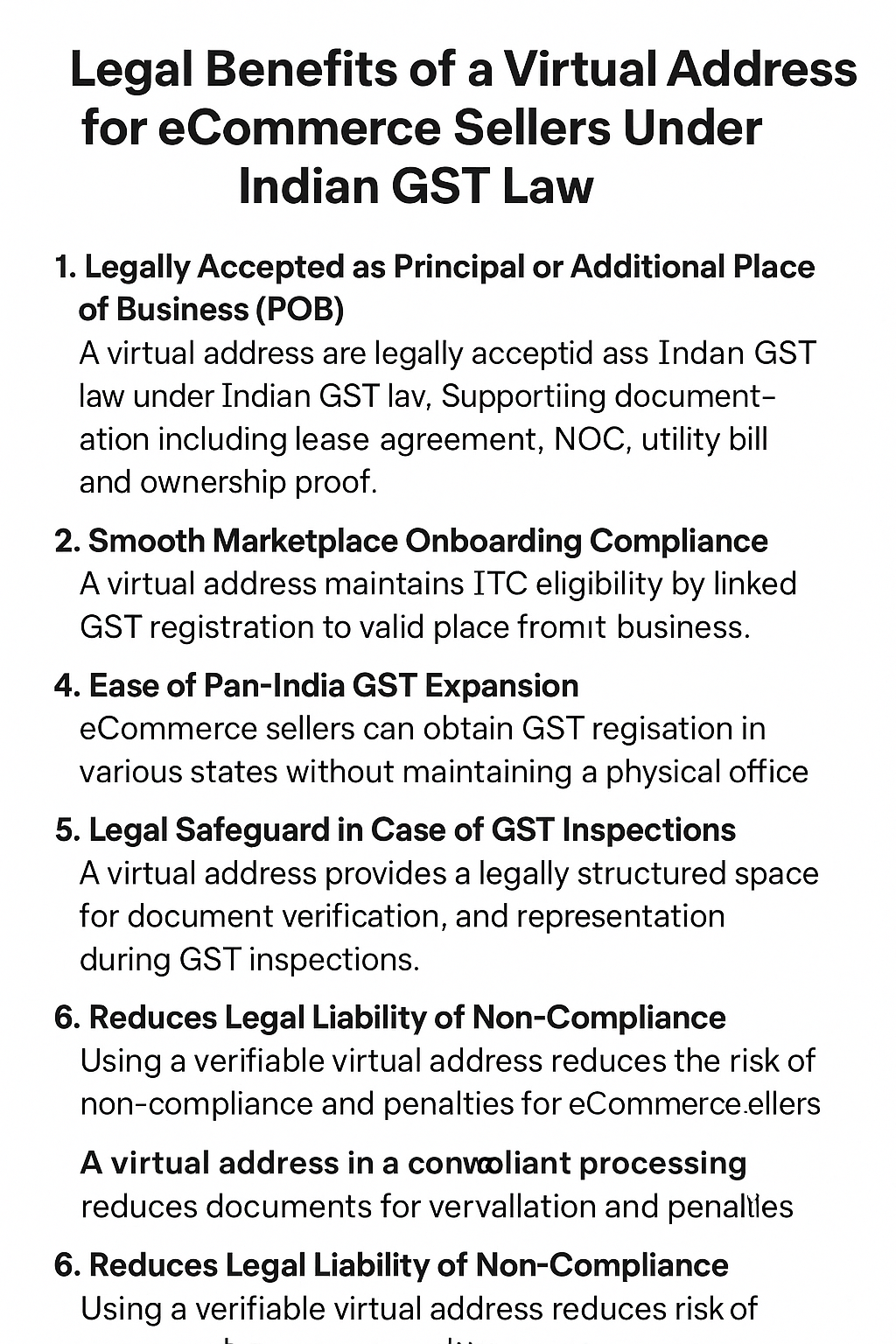Legal Benefits of a Virtual Address for eCommerce Sellers Under Indian GST Law

Strong 8k brings an ultra-HD IPTV experience to your living room and your pocket.
In today’s dynamic digital economy, the virtual address for eCommerce sellers is no longer a convenience—it's a legal and strategic necessity. With the growing demand for eCommerce operations across multiple states in India, sellers are now required to comply with location-specific Goods and Services Tax (GST) regulations. Under Indian GST law, the legal acceptance of virtual addresses has made business expansion easier, compliant, and more cost-effective. This article explores the core legal benefits of using a virtual address for GST compliance, registration, and long-term scalability for online sellers.
1. Legally Accepted as Principal or Additional Place of Business (POB)
The most significant legal advantage of a virtual address for eCommerce sellers is its validity under Indian GST law. According to Rule 8 and Rule 9 of the CGST Rules, 2017, businesses must declare a Principal Place of Business (PPOB) and, where necessary, Additional Places of Business (APOB) in every state where they intend to operate.
A virtual address, when backed by proper documentation (lease agreement, NOC, utility bill, and ownership proof), is legally valid for registration. GST departments across India accept coworking space addresses, business center addresses, and virtual office leases provided the documentation complies with prescribed formats.
2. Smooth Marketplace Onboarding Compliance
Marketplace platforms like Amazon, Flipkart, Meesho, and JioMart require state-specific GST numbers for onboarding sellers in each delivery zone. A virtual address for eCommerce sellers enables legally compliant registration in states without the burden of maintaining a physical office.
Legally speaking, eCommerce sellers must list a valid place of business with the GST portal while onboarding. Virtual office providers ensure that all supporting documents meet marketplace and GST portal standards, thus avoiding registration rejections, delays, or future scrutiny.
3. Supports Input Tax Credit (ITC) Eligibility
Under Sections 16 and 17 of the CGST Act, 2017, a registered person is entitled to claim Input Tax Credit (ITC) only if the goods or services are used in the course or furtherance of business. To ensure ITC eligibility, your GST registration must be linked to a valid and active place of business.
Using a virtual address for eCommerce sellers ensures compliance with address-related ITC conditions. When purchase invoices carry the GSTIN linked to your virtual address, you're legally allowed to claim ITC. This is particularly helpful for sellers routing goods through third-party logistics or warehouses in different states.
4. Ease of Pan-India GST Expansion
As per Section 22 of the CGST Act, sellers are required to obtain registration in every state from where they make taxable supplies. Traditionally, this meant setting up physical offices across multiple states—a costly and complex affair.
A virtual address for eCommerce sellers resolves this by enabling state-wise GST registration legally, without physical presence. The virtual address can be used as a PPOB or APOB, depending on business needs, and is accepted by tax officers if accompanied by notarized or registered lease documents and other mandatory proofs.
5. Legal Safeguard in Case of GST Inspections
One of the common fears among sellers using virtual addresses is inspection by GST officers. However, the GST Act does not prohibit shared or leased office usage as long as documentary evidence is valid.
A virtual address for eCommerce sellers provides a legally structured space where documents, signboards, and employee authorization letters can be presented during verification. Reliable virtual office providers ensure your business board is placed, records are accessible, and authorized representatives are assigned to deal with GST officials if required.
6. Reduces Legal Liability of Non-Compliance
Using your home address or unverifiable premises for GST registration may lead to application rejection or future cancellation under Rule 25 of the CGST Rules. Legal consequences include demand notices, penalties under Section 122, and even blacklisting.
Choosing a virtual address for eCommerce sellers from a verified provider reduces the risk of legal disputes. Sellers benefit from pre-verified documentation, compliance with local municipal norms, and GST officer cooperation in case of verification visits.
7. Legally Compliant Lease Documentation
For GST purposes, one of the key requirements is a valid rental or lease agreement. As per department advisories, a non-registered rent agreement must be supported by ownership documents and ID proof of the lessor.
A compliant virtual address for eCommerce sellers includes:
• Notarized or registered lease agreement
• Utility bill in the property owner’s name
• Owner’s ID and PAN card
• Letter of Authorization for the applicant
All these documents help avoid legal complications and ensure registration is processed without queries or objections.
8. Supports Statutory Notices and Communication
Under GST law, all statutory notices, assessments, and communication are sent to the registered place of business. Therefore, having a legally accepted virtual address for eCommerce sellers ensures you receive all legal communication on time.
Most virtual office providers offer mail forwarding services, email notifications, and documentation tracking, helping you meet legal deadlines and avoid missed compliance dates.
9. Compliance with E-Commerce Aggregator (ECA) Rules
If you’re operating through an E-Commerce Operator (ECO), such as Flipkart or Amazon, it becomes legally necessary to register under GST in the state where the warehouse or fulfillment center is located. Section 24 of the CGST Act mandates compulsory registration in such cases.
With a virtual address for eCommerce sellers, this legal mandate is fulfilled without needing a physical presence at each warehouse location. It ensures seamless tax invoice generation and credit flow in inter-state movement of goods.
10. Preparedness for Legal Audits and Scrutiny
Under GST law, the Commissioner or any officer authorized under Section 61 or Section 65 can initiate scrutiny or audits of a registered person. Using a virtual address for eCommerce sellers with compliant documentation ensures that your records and address are legally defensible during such audits.
Some reputed virtual office providers even help maintain minimal statutory documents onsite to present during inspection—ensuring you are legally prepared and protected.
Conclusion
In conclusion, a virtual address for eCommerce sellers offers a wide array of legal benefits under Indian GST law—from registration to audit readiness. It enables hassle-free multi-state GST registration, ITC compliance, and eCommerce onboarding without physical office costs.
For growing online sellers, especially SMEs and D2C brands, using a virtual address is not only a cost-effective solution but also a legally compliant and future-ready strategy. Partnering with a verified provider like TheGSTCo ensures all documentation is in order, legal obligations are met, and your business can scale seamlessly across India.
Note: IndiBlogHub features both user-submitted and editorial content. We do not verify third-party contributions. Read our Disclaimer and Privacy Policyfor details.



